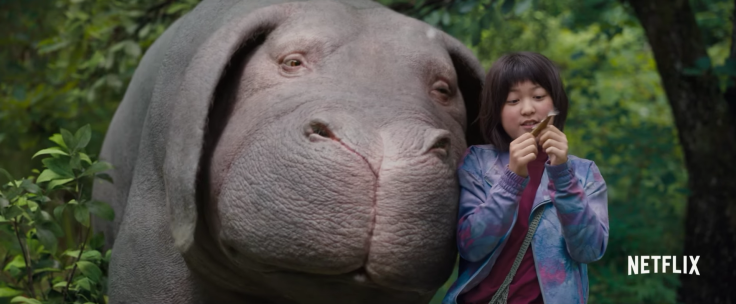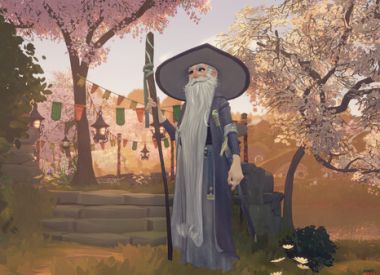Okja, a giant super pig, suffers greatly in Okja, as so many billions of animals do in the immense, industrialized network we’ve built to torment and kill them. There are moments of Okja that harrow the soul — unspeakable acts of violence, torture, rape and terror. But though the analogy to our own meat industry is anything other than subtle, Okja isn’t a message movie. Instead, it’s one of the greatest adventure films of the century, as Mija (An Seo Hyun) does everything within a single human’s power to rip her best friend Okja back from the dehumanizing forces of profit, PR, police power and the boundless cowardice of a society that prefers the violence of its appetites be hidden from them.
Okja is often wondrous, but just as often deceptive, exposing monstrousness that would wear the fantastical, dead and skinned, as a mask. Okja opens with the kayfabe of business, as Lucy Mirando (Tilda Swinton) — CEO of Mirando Corp. after deposing her sister Nancy — distances herself from her company’s terrible past and charts a new future. Hiding a deeply cynical plot under a guise of New Age, pro-environmental sanctity and a springtime pastel palette, Lucy orchestrates a worldwide “Best Pig” competition, a public spectacle on behalf of her revolution in meat: the genetically-engineered super pigs.
What we see next is the opposite of that repulsive spectacle, as Okja and Mija play somewhere in the mountains outside Seoul. Her grandfather was chosen to raise one of Mirando’s super pigs, so Okja and Mija have grown up together. Rather than the soulless PR spectacle we just witnessed, their play is an expression of love, creativity and genuine empathy, absent the ulterior motive of a corporate power that weaponizes sympathy. But then Mirando’s stooges, including safari TV host Johnny Wilcox (Jake Gyllenhaal), come to take Okja back.
Mija chases them to Seoul and then all the way to New York, making partial alliance with an oddball animal liberation group — a collection of vegans and pacifists, headed by Jay (Paul Dano) and riven with its own internal problems of power — to try and save Okja, first from exploitation and then from outright slaughter.
Okja ’s first half is kinetic and exciting, a pure rush of energy as Mija runs through corporate offices, dives on truck tops and flees with Okja through a packed mall — a sequence with the energy of a Blues Brothers car chase and the attention to subtle whimsies of Jacques Tati’s Playtime. With boundless imagination, energy and visual wit Okja elevates life above our daily experience with it. There’s a comic tone to Okja that’s rarely out-loud funny (though some of its laughs are tremendous), but endlessly affirming of life’s vibrancy and color. Okja visits the very darkest corners of our species, but just as often proves, through Mija, that there’s much worth fighting for and genuine goodness to be won.
Okja combines Peter Jackson’s King Kong, Babe: Pig in the City and even a bit of Starship Troopers’ satirical edge, but further achieves a state of visual grace more akin to master animators like Hayao Miyazaki. Which is not to say that its hyperreality is without peril. There are going to be many, many people who ding Okja for its completely bonkers, over-the-top characters. Gyllenhaal’s Wilcox, in particular, is a simpering, shrieking, gibbering loon. Lucy (and later Nancy) Mirando frequently speaks in long, self-righteous diatribes (Hail, Caesar! already established that no one should make Tilda Swinton play twins, forcing the otherwise masterful actor to compete against herself). But I suspect that some of the abrasive, booming characters will instead become part of why it’s treasured. The villains’ flight into insanity and caricature dramatizes how far they’ve flown from the human core that still resides within them. They’ve distorted themselves to fit the monstrous shape of their industry, believing they’re in control and proceeding from noble motives, blind to how they’ve been twisted.
And there’s nothing quite like the whiplash Okja can deliver, as Wilcox goes from short-shorts silly walks to a specter of terror, or as Lucy plots her next move against a pre-teen girl. Okja has a deep reservoir of anger for them, their lies and the mercenary army they employ to defend those lies, but it never flattens them into a generic evil. Lucy and Wilcox may be the face of a killing machine, but so many of their most sadistic actions come from self-hatred and tormented rationalizations, reflecting like a funhouse mirror our own individual grapplings with the overwhelming cruelties and compromises of a life that pits us against billions of peers in the name of meritocracy and profit.
Okja is the rare movie that can ping the emotional needle to its max, alternately from the exaltations of love and the depravities of torment and death. Unbidden tears could come at both the sublimity of its rollicking, narrative mastery or at the sight of a giant chainsaw, spinning up to slice apart a super pig that was breathing moments before. Spinning from slapstick action sequences to over-designed corporate affairs to the slaughterhouse floor, Okja is as triumphant, exhilarating, moving and life-affirming as movies get, leaving in its aftermath the absolute certainty that no matter how immense the behemoths of human evil grow, there will always be someone like Mija to stand in the way and say clearly “that’s enough.”
- adorable pig
- like a live-action Miyazaki
- amazing young hero in Mija
- outstanding action
- harrowing and horrific moments
- there's not more of it



















